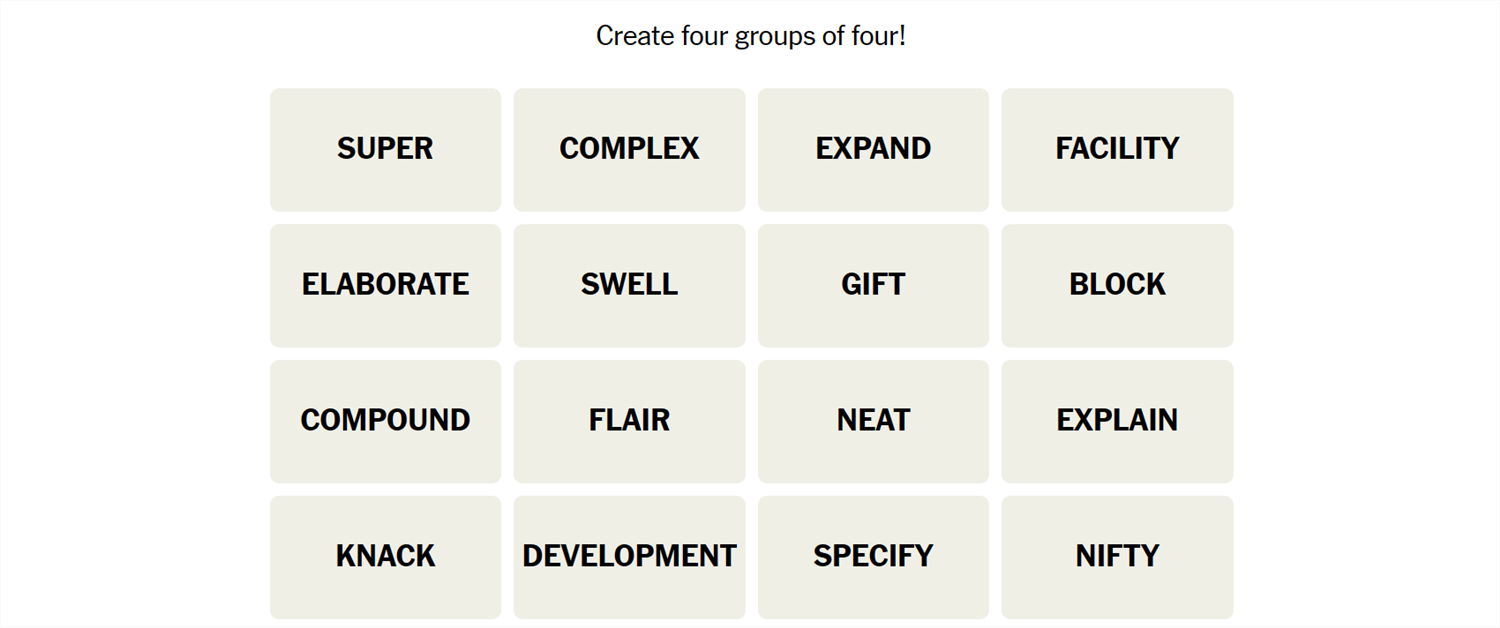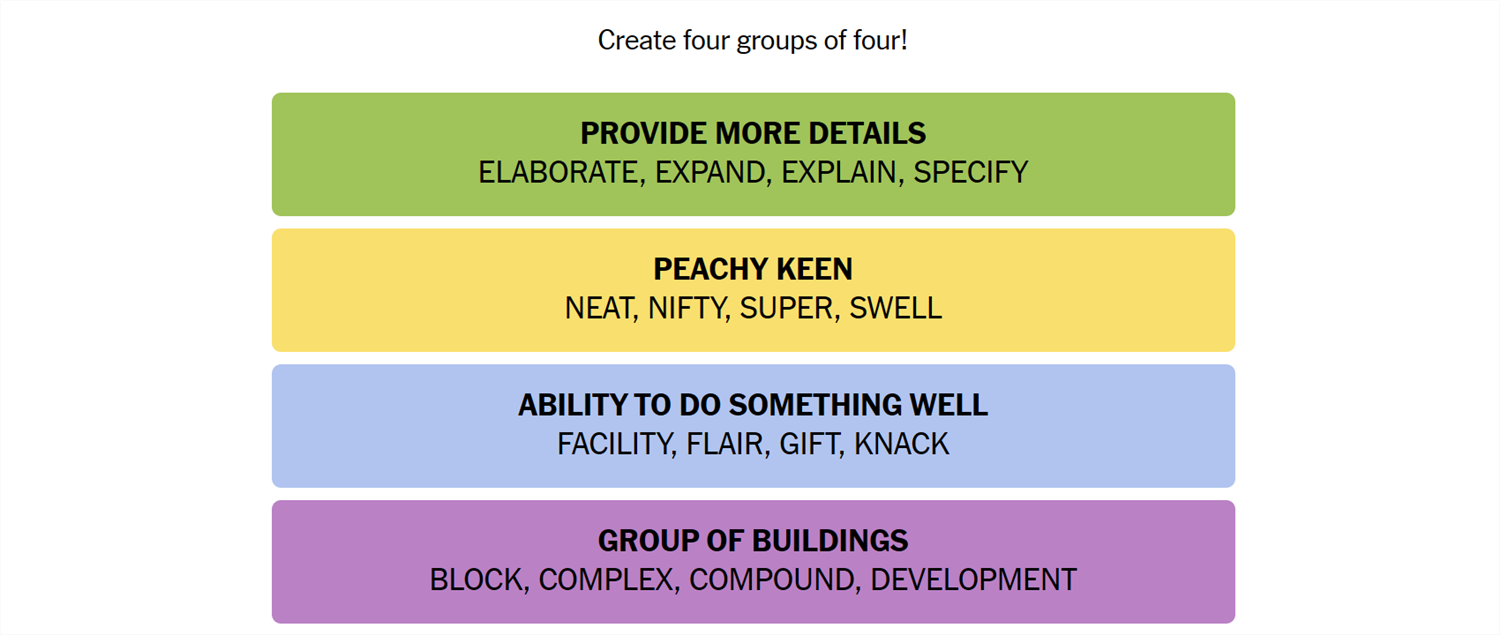
July 30Th Insights From the New York Times: Unveiling Connection Tips & Answers (#415)

July 30Th Insights From the New York Times: Unveiling Connection Tips & Answers (#415)
Quick Links
- What Is Connections?
- Hints for Today’s Connections Groups
- Today’s NYT Connections Answers
- How Did We Solve This Connections Game?
- How Do You Guess Connections Groups?
Connections is a game from the New York Times that challenges you to find the association between words. It sounds easy, but it isn’t—Connections categories can be almost anything, and they’re usually quite specific. If you need a hand getting the answers, we’ve got you covered.
What Is Connections?
Connections is a game from the New York Times. The objective is simple: sort 16 words into groups of 4. Each group of words will be connected by some common idea or theme. That common element could be anything. We have seen everything from games that rely on the number of letters in the words to categories that require you to spot an extra letter at the end of the word. Sometimes they’re references to economics, other times they reference fairy tales. There is no telling what sort of association there will be between words.
Once you’re confident you understand the connection, select 4 words, then hit “Submit.” You have only four attempts in total, so don’t be too guess-happy.
Hints for Today’s Connections Groups
Here are a few hints for the 415th Connections game to get you started:
- Yellow: When things are going swimmingly.
- Green: When you need more information.
- Blue: Aptitude.
- Purple: When you have multiple structures together.

If you still need help, the actual group names are:
- Yellow: Peachy Keen
- Green: Provide More Details
- Blue: Ability to Do Something Well
- Purple: Group of Buildings
Today’s NYT Connections Answers

Peachy Keen (Yellow):
Neat, Nifty, Super, Swell
Provide More Details (Green):
Elaborate, Expand, Explain, Specify
Ability to Do Something Well (Blue):
Facility, Flair, Gift, Knack
Group of Buildings (Purple):
Block, Complex, Compound, Development
How Did We Solve This Connections Game?
July 30th’s Connection game came together pretty easily.
The first group I spotted was Green, “Provide More Details.” The words elaborate and explain were dead giveaways and clued me in almost immediately. From there, expand and specify were easy to pick out.
Swell, neat, and super all struck me as words that are often used to sarcastically say something is going well, like when you’ve been struggling to finish a project and someone asks you how you’re doing. “Just swell.” Nifty was really the only other word that vaguely fit the idea, though I typically associate nifty as roughly synonymous with “interesting.” Together, neat, nifty, super, and swell were in the Yellow group, which was “Peachy Keen.”
Gift and knack together made me realize that one of the two remaining groups (likely Blue) had to do with a person’s aptitude or ability. Facility can also sometimes mean “capacity,” which is close to the first two words, and seemed like a good word to include. That left flair, which is also closely related, though it is often used to describe someone’s tendencies more than their abilities. Together, those 4 words were in the Blue group, which was “Ability To Do Something Well.”
Block, complex, compound, and development together all suggested the connection was related to groups of buildings or structures. That was dead on the money—Purple was “Group of Buildings.”
How Do You Guess Connections Groups?
There is no quick, reliable way to approach Connections like there is with Wordle, since Connections isn’t algorithmic. However, there are a few things to keep in mind that can help.
- Look for similar parts of speech. Are some words verbs and others nouns? Are some adjectives? Try mentally grouping them based on those categories and see if any other patterns jump out at you.
- Are the words synonyms? Sometimes categories will just be synonyms for a phrase, or very close to synonyms. Don’t rely too closely on this, though. Occasionally, Connections will deliberately throw in words that are sometimes synonyms to mislead you.
- Try saying the words. Sometimes, saying the words helps. One puzzle we saw included the words go, rate, faster, clip, pace, speed, move, commute, and hurry—all of which are obviously related to the idea of motion. However, when you say them, it becomes a little more obvious that only four (go, move, hurry, faster) are things you’d actually say to prompt someone to get moving.
- Expect the red herring . Connections usually has words that could be plausibly, yet incorrectly, grouped together. Take the words Bud, Corona, and Light, as an example. You might instinctively see those three words together and assume they’re lumped together in a category related to beer—but they weren’t.
- Look for distinct words. If a word on your board doesn’t have multiple meanings or can really only be used in one context, try using that word as the basis for a category.
- Shuffle the board. Sometimes, moving words around will help you look at them in new ways.
If you didn’t solve this one, don’t feel too bad—there’s always tomorrow! And those words may align with a topic you’re interested in, giving you a leg up on the competition.
Also read:
- [New] 2024 Approved Unplugging Pauses From Social Streams A 2023 Approach to Fixing Livestream Issues
- [New] In 2024, Channel Your Creativity Crafting YouTube Trailers in Filmora
- [Updated] In 2024, Top 10 Best Meme Templates
- [Updated] Unveiling Top 7 Crypto-Creators for NFT Conversion
- 2024 Approved Top Cloud Picks Price & Performance Comparison
- 2024 Approved Trailblaze with Our List of The Top 9 Resources for Dynamic 3D Fonts
- 2024 Approved Unplug and Replay Twitch Livestream Techniques
- Classic Cinema in Paperback Examining 'The Goofy Story'
- Comprehensive Steps for Securely Saving & Recovering Data on Your iOS Devices
- In 2024, Cut to the Chase Vimeo's Best Practices for Video Length Reduction
- In 2024, Top Pick Cross-Platform Devices' Ideal Entry Editor
- Lenovo Ideapad Assessment: Solid Construction on a Fundamental Machine
- SJ7's Bold Step Forward with Its Ultra HD 4K Action Cam Review
- Solving YouTube Pixel Monotony A Quick Guide for 2024
- Unleashing Windows 11'S Full Visual Potential with Automatic HDR Mode for 2024
- Title: July 30Th Insights From the New York Times: Unveiling Connection Tips & Answers (#415)
- Author: Mark
- Created at : 2024-12-19 01:32:15
- Updated at : 2024-12-24 18:31:34
- Link: https://some-guidance.techidaily.com/july-30th-insights-from-the-new-york-times-unveiling-connection-tips-and-answers-415/
- License: This work is licensed under CC BY-NC-SA 4.0.